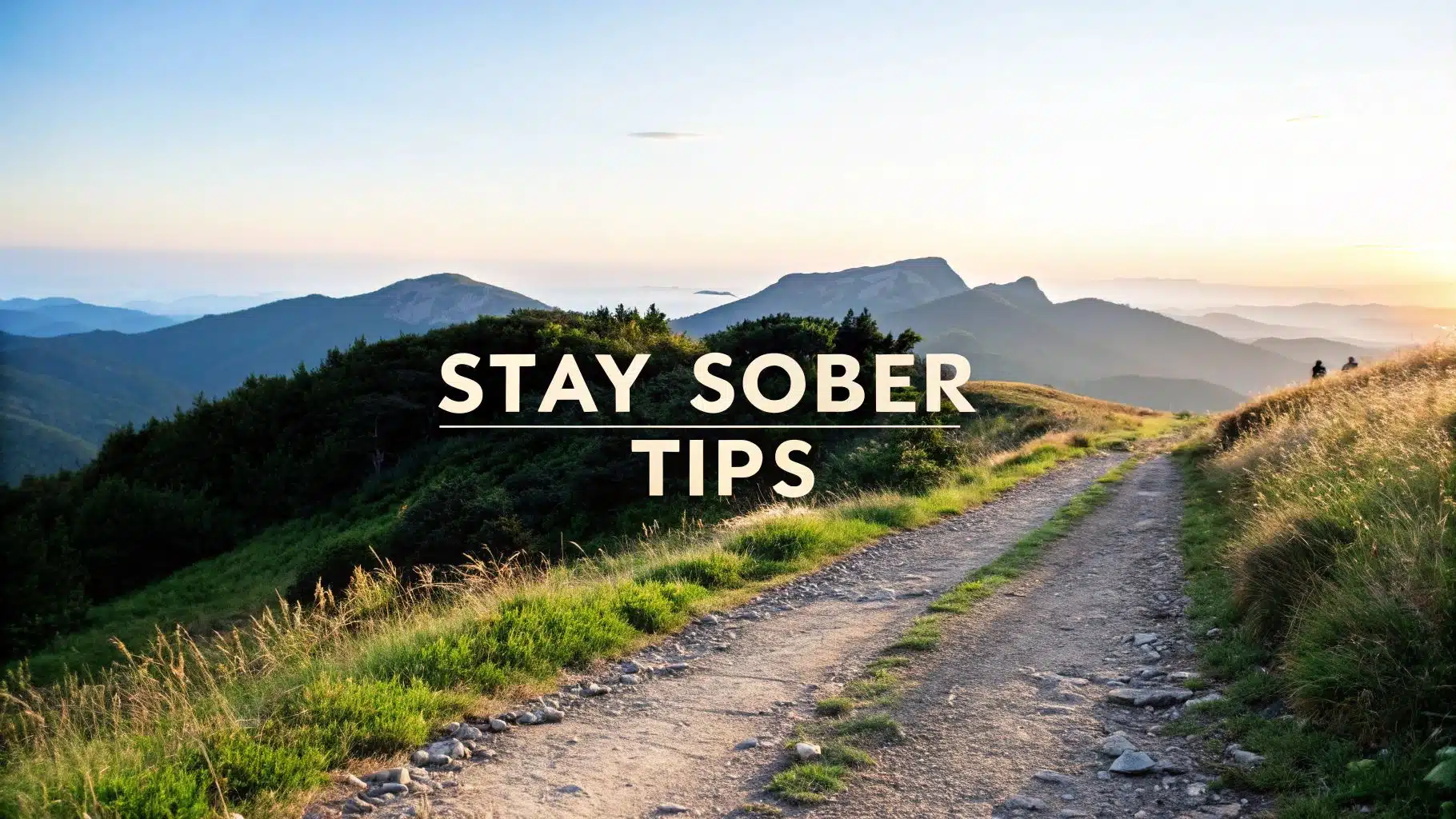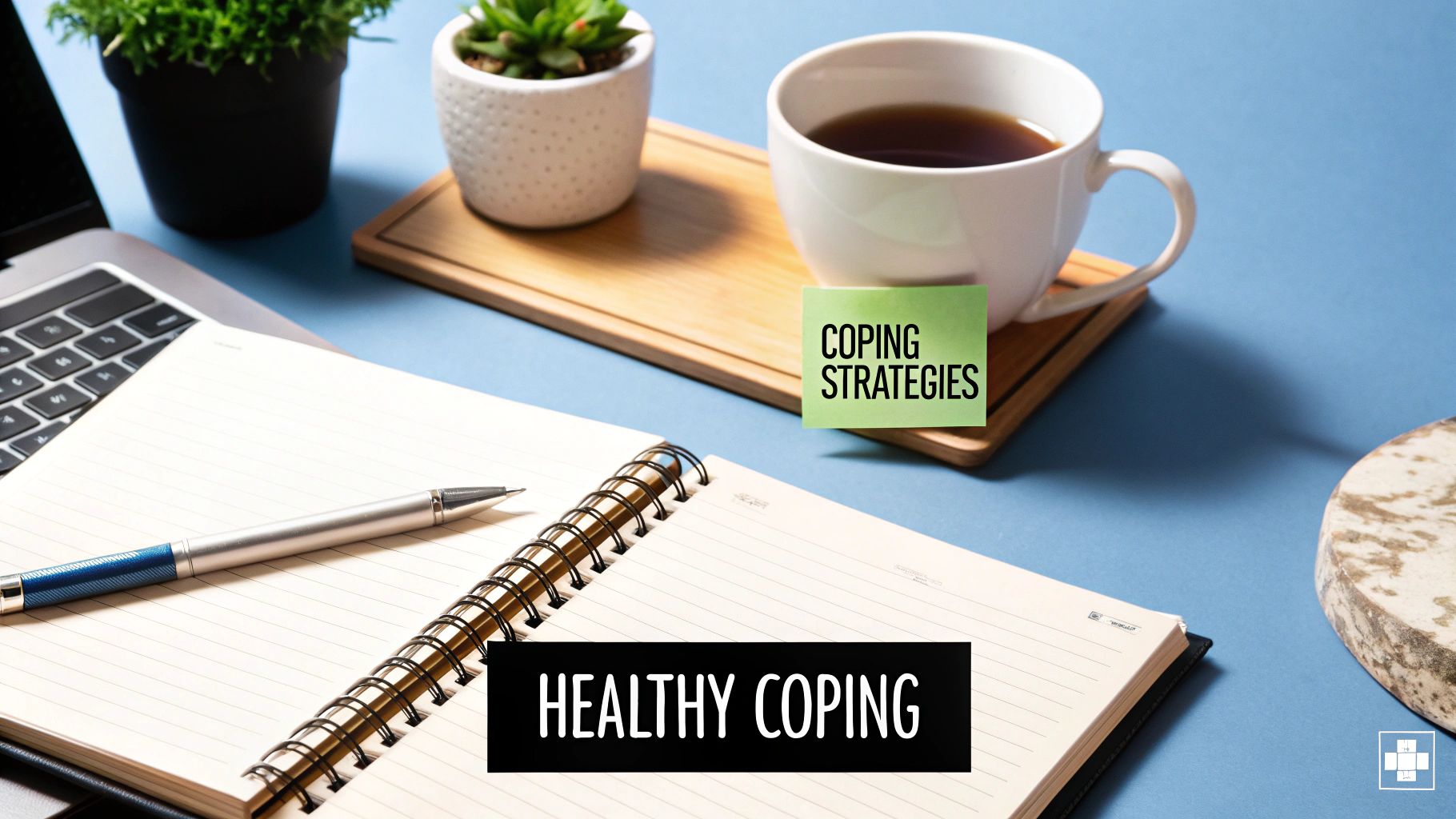
Embarking on the journey of sobriety is a courageous step, but maintaining it requires a solid plan, practical tools, and unwavering support. The path can be challenging, filled with triggers, cravings, and emotional hurdles that test your resolve. However, with the right strategies, long-term recovery is not just possible-it’s achievable. This guide moves beyond generic advice to provide you with concrete, actionable staying sober tips designed to build resilience, foster personal growth, and empower you every step of the way.
You will learn how to build a robust support system, develop healthy coping mechanisms for stress, and navigate high-risk situations with confidence. We’ll also cover creating a structured routine, focusing on physical wellness, and finding new purpose in a life free from substance dependence. Each point is designed to be a practical tool in your recovery toolkit, helping you manage challenges as they arise.
This article is your roadmap, offering specific implementation details to help you put these concepts into practice immediately. If you ever feel overwhelmed or need to talk, remember that immediate, confidential help is available. Addiction Helpline America is here for you 24/7 at (888) 555-5555 to provide the support and resources you need to stay strong in your recovery.
1. Build a Strong Support Network
One of the most foundational staying sober tips is to intentionally cultivate a robust support network. Sobriety isn’t a journey meant to be walked alone; it requires a reliable team of people who provide encouragement, accountability, and a safe space to share your struggles and triumphs. This network acts as a crucial buffer against the isolation that often accompanies early recovery and provides strength during moments of weakness or high-risk situations.

This support system can include trusted family members, non-using friends, therapists, and peers who understand the recovery process firsthand. The concept was popularized by pioneers like Bill Wilson and Dr. Bob Smith of Alcoholics Anonymous, who understood that shared experience and mutual aid were cornerstones of lasting sobriety.
How to Implement This Strategy
Creating your support system requires proactive effort. It’s not just about having people around; it’s about connecting with the right people who actively contribute to your well-being.
- Identify Your Core Team: Make a list of 3-5 people you can call without hesitation when you feel a craving or are emotionally distressed. This should include a mix of peers, family, or a sponsor.
- Explore Peer Groups: Attend various meetings to find a community that resonates with you. Options range from traditional 12-step groups like AA/NA to alternatives like SMART Recovery or Refuge Recovery. For more details on finding the right fit, you can explore various support groups for addiction.
- Be Honest and Vulnerable: A support network is only effective if you are open about your needs and challenges. True connection is built on honesty, not on presenting a perfect image of recovery.
- Maintain Regular Contact: Don’t wait for a crisis to connect. Regular check-ins, even when you feel strong, keep relationships solid and make it easier to reach out when you genuinely need help.
2. Develop Healthy Coping Mechanisms
A vital part of maintaining sobriety involves learning to manage stress, negative emotions, and triggers without resorting to substances. Developing healthy coping mechanisms means actively replacing destructive habits with constructive activities that support your mental and emotional well-being. This proactive strategy equips you with the tools to navigate life’s challenges, transforming moments of potential relapse into opportunities for personal growth and resilience.

This approach is central to modern therapeutic models like Dialectical Behavior Therapy (DBT), developed by Dr. Marsha Linehan, and Mindfulness-Based Stress Reduction (MBSR), popularized by Jon Kabat-Zinn. These frameworks emphasize that recovery is not just about avoiding substances; it is about building a fulfilling life where substances are no longer needed to cope. By adopting these new skills, you fundamentally rewire your brain’s response to distress.
How to Implement This Strategy
Building an arsenal of effective coping skills is a deliberate and ongoing practice. It requires experimenting with different techniques to discover what works best for you and integrating them into your daily routine.
- Create a Coping “Toolkit”: Identify 5-10 go-to strategies you can use in different situations. This might include physical outlets like running or yoga, creative expressions like journaling or painting, or mindfulness practices like deep breathing exercises.
- Practice Proactively, Not Reactively: Don’t wait for a crisis to use your tools. Dedicate a few minutes each day to practicing a coping skill, such as meditation or a gratitude list. This builds the “muscle memory” needed for these techniques to be effective under pressure.
- Match the Strategy to the Trigger: Different emotions call for different responses. If you’re feeling angry, a high-intensity workout might be more effective than quiet meditation. If you’re anxious, a guided breathing exercise could be the perfect solution.
- Explore Professional Guidance: Therapies like CBT and DBT are specifically designed to teach these skills. Working with a therapist can provide structured support and help you identify the most effective mechanisms for your unique recovery journey.
Call Now – Your Journey to Recovery Begins Today!

Take the first step towards a healthier life! Call now to connect with our compassionate team and start your recovery journey today. Your path to healing awaits!
Our recovery specialists are available 24/7 to provide support, and all calls are confidential and free. Reach out anytime – we’re here to help!
3. Avoid High-Risk Situations and Triggers
A critical component of staying sober involves proactively identifying and managing the triggers that can lead to relapse. This means strategically avoiding the people, places, and emotional states that you associate with past substance use. By creating distance from these high-risk situations, you give yourself the space and security needed to build stronger coping mechanisms and solidify your commitment to recovery.

This strategy is a cornerstone of modern relapse prevention therapy, developed by experts like Dr. Alan Marlatt and Terence Gorski. They emphasized that understanding and preparing for your personal triggers is not about weakness; it is about smart, strategic self-protection. Avoiding a party in early recovery or changing your route to bypass a familiar bar isn’t a sign of failure, but a powerful act of self-care.
How to Implement This Strategy
Effective trigger management requires self-awareness and careful planning. The goal is to consciously redesign your environment and routines to support your sobriety rather than challenge it.
- Create a Comprehensive Trigger List: Write down every potential trigger you can think of. Be specific and include people (old using friends), places (bars, certain neighborhoods), things (paraphernalia, certain music), and emotions (stress, loneliness, boredom).
- Develop an Action Plan: For each trigger on your list, write down a specific avoidance or coping strategy. For an unavoidable trigger, like work-related stress, your plan might involve a five-minute mindfulness exercise or a quick call to a supportive friend.
- Establish Clear Exit Strategies: Before entering a potentially challenging situation, like a family gathering where alcohol is served, have a pre-planned exit strategy. This could be a simple excuse like “I have an early morning,” or a code word you can text to a friend who knows to call you with a reason to leave.
- Modify Your Environment: Make your home a true safe haven. Remove all alcohol, drugs, and related paraphernalia. You can also make digital changes, like unfriending or muting social media contacts who frequently post about partying. For a deeper dive into this topic, you can learn more about relapse prevention strategies on addictionhelplineamerica.com.
4. Establish a Structured Daily Routine
One of the most practical staying sober tips is to create a structured daily routine. In early recovery, unstructured time can be a significant trigger, leading to boredom, anxiety, and a higher risk of relapse. A consistent schedule provides a sense of purpose and predictability, fills the hours once dedicated to substance use with positive activities, and helps rebuild a life grounded in stability and healthy habits.

This concept of harnessing routine for personal improvement has been advocated by figures from Benjamin Franklin to modern coaches like Tony Robbins. In recovery, organizations like Phoenix Recovery emphasize structure to reduce decision fatigue, which frees up mental energy to focus on sobriety. By automating daily choices, you create a framework that supports your long-term goals and minimizes opportunities for impulsive decisions.
How to Implement This Strategy
Building an effective routine is about creating a balanced schedule that you can realistically maintain. It’s a powerful tool for managing your day and reinforcing your commitment to a sober lifestyle.
- Start with Bookends: Focus first on your morning and evening routines. For example, a morning routine could include meditation, a healthy breakfast, and a short walk. An evening routine might involve reading, journaling, and preparing for the next day to reduce morning stress.
- Schedule Key Activities: Intentionally block out time for essential recovery tasks. Pencil in your work or school schedule, therapy appointments, and support group meetings. This ensures they become non-negotiable parts of your week.
- Integrate Self-Care: A good routine isn’t just about productivity; it must include time for rest and enjoyment. Schedule activities like exercise, hobbies, or quiet time to relax. This balance is crucial for preventing burnout and maintaining emotional well-being.
- Use Tools for Consistency: Don’t rely on memory alone. Use a physical planner, calendar app, or a simple to-do list to track your routine. Celebrating small wins, like sticking to your schedule for a week, can provide powerful positive reinforcement.
5. Focus on Physical Health and Wellness
Rebuilding your physical health is a powerful and often overlooked staying sober tip that directly impacts your mental and emotional resilience. Substance use takes a significant toll on the body, depleting vital nutrients, disrupting sleep cycles, and altering brain chemistry. Prioritizing wellness through nutrition, exercise, and rest helps restore this balance, making it easier to manage cravings and regulate mood.
This approach treats the body as an essential ally in recovery. Restoring physical health supports the brain’s healing process and provides a tangible, positive focus during a challenging transition. This concept is championed by leaders like Dr. Mark Hyman, who applies functional medicine to recovery, and organizations such as The Phoenix, which builds sober active communities to show the profound link between physical activity and sustained sobriety.
How to Implement This Strategy
Integrating wellness into your recovery involves making conscious, healthy choices a daily habit. It is about nurturing your body to build a stronger foundation for your mind.
- Start with Achievable Movement: You don’t need to run a marathon. Begin with a 15-minute daily walk, gentle stretching, or trying a beginner’s yoga class. The goal is consistency, not intensity. Find an activity you genuinely enjoy to make it a sustainable habit.
- Focus on Brain-Healthy Nutrition: Emphasize whole foods like fruits, vegetables, lean proteins, and healthy fats. These foods help restore neurotransmitters like dopamine and serotonin, which are crucial for mood stability. Minimize processed foods, sugar, and caffeine, which can trigger mood swings and cravings.
- Prioritize Consistent Sleep: Create a relaxing bedtime routine and stick to a consistent sleep-wake schedule, even on weekends. A well-rested brain is better equipped to handle stress and resist impulsive behavior, which is fundamental to staying sober.
- Address Underlying Health Issues: Schedule a check-up with a doctor to address any medical issues that may have been neglected or caused by substance use. Managing these conditions is a critical component of a holistic recovery plan.
6. Practice Mindfulness and Stress Management
A powerful tool for maintaining long-term sobriety is the practice of mindfulness and effective stress management. Recovery often involves learning to cope with intense emotions, cravings, and daily pressures without turning to substances. Mindfulness teaches you to observe these feelings and thoughts from a distance, without judgment, which significantly reduces their power over you and helps prevent impulsive reactions.
This approach provides a crucial alternative to the automatic, often destructive, responses learned during active addiction. The concept was pioneered for stress reduction by figures like Jon Kabat-Zinn and later adapted specifically for addiction recovery by researchers such as Dr. Sarah Bowen through Mindfulness-Based Relapse Prevention (MBRP). These methods help rewire the brain’s response to triggers, fostering calm and intentionality instead of chaos.
How to Implement This Strategy
Integrating mindfulness isn’t about emptying your mind; it’s about learning to be present with whatever arises. This skill is built through consistent, gentle practice rather than forceful effort.
- Start with Short, Guided Sessions: Dedicate just 5-10 minutes each day to a guided meditation using apps like Calm or Insight Timer. Consistency is more important than duration, especially when you are starting out.
- Focus on Your Breath: When you feel a craving or a wave of anxiety, bring your attention to your breath. Notice the sensation of the air entering and leaving your body. This simple act anchors you in the present moment and interrupts the cycle of reactive thinking.
- Observe Without Judgment: The goal is not to stop your thoughts but to watch them pass like clouds in the sky. Acknowledge a thought or craving, label it (“there is a craving”), and then gently guide your focus back to your breath.
- Explore Formal Programs: Consider joining a Mindfulness-Based Stress Reduction (MBSR) course or a yoga class focused on recovery. These structured environments provide community support and expert guidance. To discover more techniques, you can explore resources to practice mindfulness and stress management.
Call Now – Your Journey to Recovery Begins Today!

Take the first step towards a healthier life! Call now to connect with our compassionate team and start your recovery journey today. Your path to healing awaits!
Our recovery specialists are available 24/7 to provide support, and all calls are confidential and free. Reach out anytime – we’re here to help!
7. Set Clear Goals and Find Purpose
A critical component of long-term sobriety is shifting your focus from what you are leaving behind to what you are building. Setting clear goals and finding a new sense of purpose provides direction and motivation, filling the void that substances once occupied. This strategy transforms recovery from a battle against cravings into a positive journey toward a meaningful and fulfilling life.
This concept is central to many therapeutic and self-improvement models, including Viktor Frankl’s logotherapy, which emphasizes the human drive for meaning. By creating objectives that align with your values, you build a life so rewarding that returning to old habits becomes less appealing. This is one of the most proactive staying sober tips because it focuses on creating a future worth protecting.
How to Implement This Strategy
Finding purpose isn’t about a single grand revelation; it’s about taking small, intentional steps toward a life you value. It involves setting and pursuing goals that provide a sense of accomplishment and forward momentum.
- Start with Small, Achievable Goals: Begin with simple, short-term objectives to build confidence. This could be anything from establishing a consistent morning routine to finishing a book or saving a specific amount of money.
- Write Down Your Goals: The act of writing down your personal, professional, and relationship goals makes them more concrete and tangible. Review this list regularly to stay focused and track your progress.
- Align Goals with Your Values: Pursue objectives that genuinely excite you. This might include reconnecting with family, exploring a creative passion, volunteering for a cause you care about, or advancing your education and career.
- Share Your Ambitions: Tell your support network about your goals. This creates a layer of accountability and allows them to encourage and celebrate your progress along the way.
- Celebrate Milestones: Acknowledge and reward your progress, not just the final outcome. Celebrating small wins reinforces positive behavior and keeps you motivated for the long haul.
8. Learn to Manage Cravings and Urges
A critical component of staying sober involves developing specific techniques to navigate the intense cravings and urges that inevitably arise. Learning to manage cravings is not about eliminating them entirely, but about recognizing them as temporary, survivable experiences. By building a toolkit of coping strategies, you can ride out these waves of desire without resorting to substance use, which is one of the most practical staying sober tips for long-term success.
This approach is heavily influenced by cognitive-behavioral principles and the work of relapse prevention pioneers like Dr. Alan Marlatt. His “urge surfing” technique teaches individuals to observe their cravings mindfully, like watching a wave rise and fall, rather than fighting against them. This understanding transforms cravings from an overwhelming emergency into a manageable, predictable event.
How to Implement This Strategy
Effectively managing urges requires practice and a pre-planned response. When a craving hits, you need a clear, actionable plan to follow instead of defaulting to old habits.
- Practice Urge Surfing: Instead of resisting a craving, acknowledge it without judgment. Notice the physical sensations and thoughts associated with it. Visualize yourself “surfing” this urge, knowing it will eventually peak and subside, typically within 15-20 minutes.
- Use the HALT Method: Often, cravings are triggered by basic unmet needs. Ask yourself: am I Hungry, Angry, Lonely, or Tired? Addressing the root cause by eating a meal, calling a friend, or taking a nap can often dissipate the urge.
- Create a Distraction Toolkit: Have a list of go-to activities that can immediately shift your focus. This could include the 5-4-3-2-1 grounding exercise (naming 5 things you see, 4 you feel, etc.), listening to a specific playlist, or going for a brisk walk.
- Keep a Craving Journal: Log when your cravings occur, what you were doing, and how you felt. Over time, this journal will reveal patterns and specific triggers, allowing you to anticipate and prepare for high-risk situations more effectively.
Top 8 Staying Sober Tips Comparison
| Strategy | Implementation Complexity 🔄 | Resource Requirements ⚡ | Expected Outcomes 📊 | Ideal Use Cases 💡 | Key Advantages ⭐ |
|---|---|---|---|---|---|
| Build a Strong Support Network | Moderate – requires ongoing effort | High – time and social engagement | High – reduces isolation, boosts motivation | Best for emotional support, crisis moments | Diverse perspectives, immediate help, belonging |
| Develop Healthy Coping Mechanisms | Moderate to High – needs practice | Moderate – time and commitment | High – builds resilience, improves health | Useful for stress/emotion management | Provides alternatives, enhances well-being |
| Avoid High-Risk Situations & Triggers | High – lifestyle adjustments needed | Moderate – planning and vigilance | High – lowers relapse risk | Critical for those with identifiable triggers | Prevents impulsive relapse, reduces anxiety |
| Establish a Structured Daily Routine | Moderate – requires discipline | Moderate – planning and consistency | High – stability and habit formation | Ideal for those struggling with unstructured free time | Reduces decision fatigue, builds positive habits |
| Focus on Physical Health and Wellness | Moderate – lifestyle change | Moderate to High – physical resources | Moderate to High – mood and energy boost | Suitable for overall recovery support and brain health | Enhances mood, restores health, improves sleep |
| Practice Mindfulness and Stress Management | Moderate – consistent practice | Low to Moderate – time, guidance | Moderate to High – reduces stress and improves awareness | Effective for immediate stress/craving management | Scientifically supported, improves emotional control |
| Set Clear Goals and Find Purpose | Moderate – ongoing commitment | Low – primarily mental effort | High – motivation, self-efficacy | Best when additional direction and motivation are needed | Increases life satisfaction and forward focus |
| Learn to Manage Cravings and Urges | Moderate – requires practice | Low to Moderate – learning and journaling | High – immediate craving control | Crucial for high-risk craving moments | Immediate tools, reduces impulsivity |
Your Next Step Towards a Healthier Life Starts Now
Navigating the path of sobriety is not about reaching a final destination; it is an ongoing journey of profound personal growth and transformation. The collection of staying sober tips shared in this article offers a robust framework, not just for avoiding relapse, but for actively building a life that is rich, meaningful, and deeply fulfilling without the presence of alcohol or drugs. Each strategy, from cultivating a strong support network to establishing a structured daily routine, acts as a vital building block in the foundation of your new life.
Think of these tips as a personalized toolkit. On some days, you may lean heavily on your healthy coping mechanisms and mindfulness practices to navigate stress. On others, avoiding high-risk situations and triggers will be your primary focus. The power lies not in mastering one single tip, but in learning how to integrate them into a cohesive, flexible system that supports you through every challenge and triumph. This adaptability is the cornerstone of long-term success.
Call Now – Your Journey to Recovery Begins Today!

Take the first step towards a healthier life! Call now to connect with our compassionate team and start your recovery journey today. Your path to healing awaits!
Our recovery specialists are available 24/7 to provide support, and all calls are confidential and free. Reach out anytime – we’re here to help!
Key Takeaways for Lasting Sobriety
Mastering these concepts is valuable because it shifts the focus from a mindset of deprivation to one of empowerment. You are not just “giving something up”; you are gaining control, clarity, and a renewed sense of purpose. Let’s recap the core principles:
- Connection is Your Lifeline: Your support network, whether it’s family, friends, or a formal support group, provides accountability and reminds you that you are not alone.
- Structure Creates Safety: A predictable routine for your sleep, meals, and daily activities reduces decision fatigue and creates a stable environment where healthy habits can flourish.
- Health is a Holistic Pursuit: Prioritizing physical wellness through nutrition, exercise, and sleep directly impacts your mental and emotional resilience, making it easier to manage cravings and stress.
- Purpose is a Powerful Motivator: Setting clear, meaningful goals gives your sobriety a “why.” It provides a compelling reason to push through difficult moments and stay committed to your path.
Taking Action: Your Journey Forward
Embracing these staying sober tips is an act of profound self-care. It’s an investment in your future, your health, and your happiness. The journey is made one day, one choice, and one small victory at a time. Remember, the goal is not perfection, but consistent progress. There will be obstacles, but with these tools, you are far better equipped to navigate them successfully. Each healthy meal you prepare, each walk you take, and each supportive phone call you make strengthens your resolve and reinforces your commitment to a healthier, more vibrant life.
Your next step, no matter how small it feels, is the most important one. Choose one strategy from this guide to focus on this week. Perhaps it’s reaching out to a friend, planning your meals, or trying a five-minute mindfulness exercise. Taking consistent, deliberate action is what transforms knowledge into lasting change.
If you’re ready to take that next step but aren’t sure where to begin, help is just a phone call away. The compassionate and confidential team at Addiction Helpline America can connect you with the resources and support you need to build a strong foundation for your recovery. Visit Addiction Helpline America or call their 24/7 hotline to speak with someone who understands and can guide you toward the right path.
Our helpline is 100%
free & confidential
If you or someone you care about is struggling with drug or alcohol addiction, we can help you explore your recovery options. Don’t face this challenge alone—seek support from us.
Programs
Resources
Will my insurance
cover addiction
treatment?
We're ready to help
Find the best
drug or alcohol treatment
center
Are you or a loved one struggling with addiction? Call today to speak to a treatment expert.















